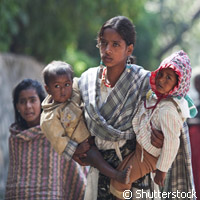Europeans in quest to fight gender and sexual-based victimisation
Asylum seekers, young refugees and undocumented migrants are at greater risk of being victimised, from gender and sexual standpoints, at reception and asylum centres in Europe, according to a new study. The research was funded in part by the SENPERFORTO project, which is backed by the European Commission's Daphne Fund. The objective of this Fund is to prevent and fight all forms of violence against women, young people and women. It also aims to support organisations active in this field and to foster cooperation between them. The 'Hidden Violence is a Silent Rape' participatory project, led by the International Centre for Reproductive Health (ICRH) at Ghent University in Belgium, identified that fellow residents and reception and asylum staff are the leading offenders. Over 90% of the victimisation cases were not reported to the authorities. The staff in reception and asylum centres, for their part, say they lack the capacity, means and tools to perform three key activities, namely to identify risk and indicative factors for upcoming sexual and gender-based violence (SGBV); to develop preventive measures in a culturally competent and participatory way; and respond when SGBV arises. Both information and regulations on SGBV against asylum seekers, young refugees and even children not accompanied by their parents are lacking. Also missing, say the project partners, are a standard operating procedure and a code of conduct for those working in the reception and asylum sector. Interviews with 599 people (57.3% males and 42.7% females) living or working in reception centres generated reports of 721 violence experiences. Of the sample, 43.4% did not describe a case of violence within a 12-month period. But 56.6% of the respondents reported cases of violence that occurred in the 12 months before their interview. Most of the cases (89.1%) were reported in 4 of the 8 partner countries, namely: Malta (158 cases, or 26.4% of all reported cases), Belgium (146, 24.4%), Ireland (132, 22%) and Hungary (102, 17%). A total of 73 cases (12.2%) were reported in Greece, 68 (11.4%) in the Netherlands and 28 (4.7%) in Spain and 14 in Portugal (2.3%). A European consortium of 14 partners is determined to fight and provide solutions to this problem. The SENPERFORTO project, which brings together experts from Belgium, Spain, Greece, Ireland, Hungary, Malta and the Netherlands, is addressing SGBV prevention in the European reception and asylum sector from within by pooling the resources of key stakeholders in EU Member States. SENPERFORTO, which means 'no more violence, without violence' in Esperanto, is putting the spotlight on determining the specific knowledge, attitude, practice and needs of both staff and people residing in the European reception and asylum sector with respect to SGBV. The experts say the answers they get will help to launch a 'needs-, rights-, and evidence-based, participatory and gender-balanced European Frame of Reference for Prevention of SGBV' in Europe's reception and asylum sector. The objective of this frame of reference is to improve the health and well-being of both residents and staff who are either living or working in reception and asylum centres in Europe. To ensure this occurs, preventive actions will be established emphasising participatory and human rights, as well as healthy relationships, sexuality and equality, and an intercultural dialogue. Creating a comprehensive SGBV prevention and response policy requires discussions and negotiations, the experts say. In addition, it is important that the policy be tailor-made to each specific reception centre. All centres can meet their own needs by using the 'hands-on' approach that the frame of reference offers. While the frame of reference is primarily designed for European reception and asylum centres, other institutions can adapt the SGBV prevention and response policy to meet their needs as well.
Countries
Belgium, Greece, Spain, Hungary, Ireland, Malta, Netherlands



